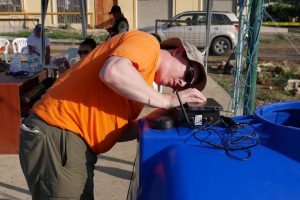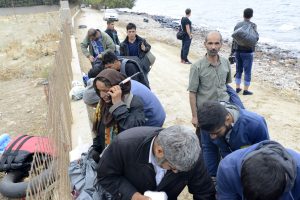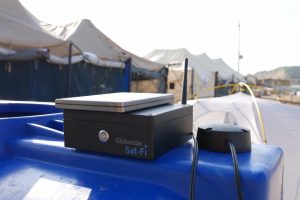 In this interview series, SpaceWatch Middle East is taking a closer look at outstanding SatCom solutions and innovations. In this exclusive interview, SpaceWatch Middle East’s Helen Jameson speaks to Evert Bopp, Founder & CEO of Disaster Tech Lab.
In this interview series, SpaceWatch Middle East is taking a closer look at outstanding SatCom solutions and innovations. In this exclusive interview, SpaceWatch Middle East’s Helen Jameson speaks to Evert Bopp, Founder & CEO of Disaster Tech Lab.
Have you ever thought about how communications change the lives of people in crisis? If not, you need to sit down and speak to Evert Bopp, Founder of Disaster Tech Lab. I did, and it has certainly made me think.
Disaster Tech Lab is a remarkable organisation that provides rapid response networks for use in disaster and humanitarian aid work. The brainchild of IT professional, Bopp, it was founded in early 2010, after the Haiti Earthquake. That said, the idea of DTL goes back much longer than that. After the Asian tsunami in 2004, Bopp was thinking about the challenge of coordinating different organisations. “One of the things that jumped out at me was that there were lots of organisations out there responding to it [the tsumani] and sending people and aid supplies to the region. But there was a distinct lack of communication between the different organisations and they seemed to operate in their own little silos.”
After raising a family, Bopp found that he had more time to dedicate to the cause and when the magnitude 7.0 earthquake struck the island of Haiti, he felt that it was the right time to put his plan into action, as he noted that the coordination between the NGOs on the ground was not effective. The quake was absolutely devastating, killing over 200,000 people and leaving over one million homeless. Bopp pulled together a small team of volunteers and some donated equipment and set out for Haiti with a short mission description: to go out there, speak to the organisations on the ground and find out how DTL could be of help.
“We literally ended up driving round and when we saw a refugee camp or a field hospital, for example, we’d just pull up and explain what we could do for the people. We found out what their communications needs were,” Bopp explains. “There was such a big need for these services right there and then. We connected camps and field hospitals to the Internet so they could do telemedicine and basic communications and email.”

What the team thought would be a short term mission turned into something much more significant. DTL remained on the ground in Haiti for around two and a half years.
“We went from a disaster response phase which lasted about 6 months to a re-building phase where we ended up putting Internet access into rural schools and communities,” continues Bopp. “We completed about 30 projects in that 2 and a half year timeframe.”
Once the team arrived back from Haiti, they sat down to take stock. They decided to take their experiences and contacts to set up a rapid response team that could deploy to a disaster no matter where in the world it had happened. The team developed a project plan that allowed them to get all the necessary resources in place. Within hours of this happening, the team received a request for assistance in the aftermath of Hurricane Sandy, the largest Atlantic hurricane on record. This turned into a three month project where DTL provided Internet connectivity to affected communities, enabling FEMA workers, City of New York personnel, the Fire Department and Police to stay in touch. Since Sandy, DTL has expanded and has been involved in every disaster that has occurred globally over the last few years.
Mobilisation
So how does DTL mobilise in the event of a crisis? DTL operates through a network of volunteers. They are alerted to a crisis through requests for help and also through a system of alerts.
“We have a database of over 200 volunteers in 11 countries and what we normally do is monitor things that happen across the globe and we have all kinds of alerts set up, so that we know within minutes,” says Bopp. We know from experience that we will be required. We reach out to the local authorities and national organisations in the area that we have contacts with and we decide whether to deploy.”
If the team does make the decision to deploy, a team of four volunteers are sent to the affected area to carry out an assessment to conclude how extensive the damage is to infrastructure and what kind of requirements are there. An email is then sent out to the volunteer database with details of what is required and then the team select the most qualified and responsive volunteers.

Responding to the European Migrant Crisis
DTL became involved in the response to the European migrant crisis around 14 months ago. The experiences that the DTL team has had during this time have been profound. As a crisis, this is different to any that the team has responded to before.
“We decided to respond to the refugee crisis that was hitting southern Europe for the simple reason that it was on our doorstep so we felt like we had to do something” says Bopp. “There was a distinct need for communications and connectivity services, but it was breaking new ground for us because it was a humanitarian crisis and previously, everything we had responded to had been a natural disaster.”
DTL has been working in Greece, an area that has been heavily affected by the refugee crisis due to its location at the other end of the perilous sea crossings being made every day from Turkey. As has become a familiar pattern, the initial plan to put up a few Wi-Fi hotspots became a much more significant mission. To date, DTL has provided Internet access to 14 refugee camps across the island of Lesvos and mainland Greece.
Equipped with a number of Globalstar satellite phones and equipment to put up some Wi-Fi hotspots, the volunteers deployed were told to go down to the beaches where the refugees were actually arriving, in small, flimsy rubber boats and to offer them access to the satellite phones. What the team witnessed was the true power of communication. Bopp explains: “Obviously, the satellite phones can work everywhere. These connect instantly, as do the Globalstar satellite hotspots that we also were equipped with. We were able to offer this to these people, who may have been travelling for three or four months, over dangerous terrain and a terrifying sea crossing. We enabled them to contact family that they had not been able to contact since they left – here’s a call, make a call, tell your family that you’re alive and safe. That has such a huge impact. People were in tears at the opportunity.”
People also put that communication with loved ones above taking care of their health.
Bopp continues: “It is not an exaggeration to tell you that we had people who were queuing for medical care and the moment they saw there were free satellite phone calls available, they would actually leave the medical queue and walk to make the call first. That gives you an indication of the impact that communication has. We had young teenagers calling their mummy and their daddy at home in Aleppo or wherever they were – and this was the first sign of life they had had in months. The significance of that is huge. That made a short, but very distinct impact.”
DTL was approached by the UNHCR that were in the process of building the first refugee camps in Lesvos. They asked DTL to provide Internet access to the first two refugee camps. This was a challenge for the team as the camps were being constructed on greenfield sites with absolutely no infrastructure. The DTL volunteers had to bring in everything necessary to establish communications from solar panels to batteries and posts to mount equipment on.
During the first eight or nine months of the crisis, refugees would arrive on the island and register themselves as asylum seekers, which allowed them to travel on into Europe. This meant that there was a steady churn of refugees moving through. According to Bopp, in the first 12 months, around 400,000 refugees passed through the two camps that DTL had provided Internet access to. This was the reality of the scope of demand. However, the situation changed in March, when Turkey and the EU signed an agreement where Turkey agreed to the rapid return of all migrants not in need to international protection. This triggered the establishment of a range of new refugee camps on mainland Greece. Plans initially numbered 30 new camps.
“We took on about 18 camps at the time and provided Internet access,” says Bopp. “Some of those have been closed since, and people have moved to the larger camps. There are about 14 camps currently. This is where the satellite communications come in again. It was very important for our teams to have their own communications whilst on the ground and when they go to locations where there is no infrastructure whatsoever.”
To protect the volunteers, DTL used Globalstar satellite phones, which provided a vital link to other team members as well as to the headquarters in Ireland. Globalstar SPOT trackers were also used to track the whereabouts of team members form a security perspective.
“On Lesvos last winter, one of the lessons we learned was that it isn’t always sunny in Greece,” says Bopp. “It got extremely cold, icy and snowy and we had teams deployed in mountainous terrain by foot and by car – and at night. There were a lot of accidents so we needed to know where they were. We also used the trackers in Haiti and Ecuador and many other places. The satellite phones are always widely used before any infrastructure is established.”

Longer Term Arrangements
In the past two weeks, DTL has completed a network at the Skaramagkas refugee camp that houses 3,000 people. This is the second largest camp in the region and houses migrants that must go through the formal asylum process, which can take up to six months. This has changed the needs of the refugees as they are staying in the camps for a long period of time. As a result, DTL and other NGOs are acting to provide refugees with much more than just shelter and communication. They are actually working to help them to learn and build up their skills.
“One of the things happening a lot is that other NGOs are setting up small schools for the children and for the older refugees in the camp,” says Bopp. “We are providing these schools with Internet access. Aside from the children, most of these people are well educated or had good jobs back in Syria. These people are doctors, surgeons, entrepreneurs – all sorts of people.”
He continues: “Their level of English is good – they are well educated. They all had a fair amount of money. To pay a smuggler to take you across on a boat costs $1000-$1500. Quite a lot of people were able to pay for that. There were some booking into hotels. These were not economic migrants. These people were being bombed. They were escaping war.”
Bopp and his team recognised that it was important to give the migrants a purpose, to improve their skills. As a result, DTL decided to identify refugees with IT skills that could be trained to not only help the team, but to help to maintain the network that was built. This, in turn, helps to give a sense of ownership and increase their individual skills and long-term employment prospects.
Internet access continues to have a profound and empowering effect for the refugees who use it. The official asylum process must be initiated through a Skype call, and this has fast tracked the establishment of Internet access at refugee camps. “This was at a point when most camps didn’t have any electricity or running water or proper housing,” explains Bopp.
For many, it’s the opportunity to gain information. DTL set up a landing page on their networks for the website www.refugee.info.eu. This portal contains all relevant information for newly arrived refugees. DTL monitors the network once it is up and running and has noted that instant messaging is used a lot, such as Facebook Messenger and WhatsApp. Then, once people are alerted that their asylum application has been accepted, they are told which country they will go to, and can then research the cities, services and opportunities available to them. They can also reach out to refugees in that country, too.
Can You Help?
I hope that, in this short article, I have managed to capture just a small amount of the incredible work that DTL does. An important question to ask, though, is how can SpaceWatch Middle East readers help DTL?
“We are an NGO and there are three things that are our lifeblood,” says Bopp. “First is a continuous influx of volunteers. We are growing and need more skilled volunteers all the time. Second is equipment. We have a couple of strong relationships with providers of equipment such as Globalstar. They help us with any need at the drop of a hat. The third is financial donations. We are able to operate on a very low budget but we always need money to cover the cost of getting a team on the ground. That ranges from private to corporate donations.”
In recognition of its work, Disaster Tech Lab is the recipient of a Better Satellite World Award from SSPI. This important award highlights the organisations that are quietly making an impact on the world. “It’s not just an award for us,” says Bopp, “but it’s an award for all the volunteers that have worked with us over the years. This sort of work often goes unnoticed so this will heighten awareness of the work that we do.”
If you can help DTL continue to carry out its priceless work. If you have any spare time and skills that you can offer, or if you have any ideas that may help the team, get in touch. These people are changing lives that have literally been ripped apart – through the power of communications and the need to make a true difference.
Visit www.disastertechlab.org
SpaceWatch Middle East thanks Evert Bopp, Founder & CEO of Disaster Tech Lab, for the interview.
Original published at: http://spacewatchme.com/2016/11/evert-bopp/
 SpaceWatch.Global An independent perspective on space
SpaceWatch.Global An independent perspective on space

